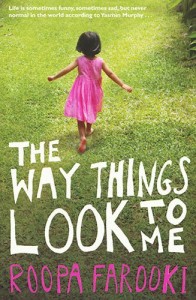Anne Barnhill, who has written a memoir about growing up with an autistic sister, reviews a fictional treatment of a similar family situation.
(Congratulations to Anne, whose novel, AT THE MERCY OF THE QUEEN: A Novel of Anne Boleyn, Debut will be published by St. Martin’s Press in January!)
By Anne Barnhill
THE WAY THINGS LOOK TO ME. By Roopa Farooki. St. Martin’s Press. 338 pages. $25.99, hardback.
 In Roopa Farooki’s fourth novel, The Way Things Look To Me, she explores sibling relationships when one of the siblings must cope with a developmental disability, in this case, high-functioning autism. As young adults, the siblings find themselves orphaned, and Asif, the eldest and only brother, cares for Yasmin, the youngest daughter, the one with autism. Lila, the middle sister, one year younger than Asif, uses her beauty to abuse herself and others, all because she feels bitter about her childhood, a childhood she views as having been stolen by Yasmin’s needs.
In Roopa Farooki’s fourth novel, The Way Things Look To Me, she explores sibling relationships when one of the siblings must cope with a developmental disability, in this case, high-functioning autism. As young adults, the siblings find themselves orphaned, and Asif, the eldest and only brother, cares for Yasmin, the youngest daughter, the one with autism. Lila, the middle sister, one year younger than Asif, uses her beauty to abuse herself and others, all because she feels bitter about her childhood, a childhood she views as having been stolen by Yasmin’s needs.
Farooki tells the story in alternating chapters from the points of view of all three siblings. She manages to capture Yasmin’s voice, which is no easy task:
My name is Yasmin Murphy, and I don’t remember very much about the morning that my mum died, which is odd, as normally I remember everything about a particular day. Everything. Everything. For example, if we take another random day, like the 27th of March last year. (I chose that day because March is the third month of the year, and three is my favourite number, because it is pink and a little bit billowy in my head, like candyfloss or clouds in the sunset, and twenty-seven is the cube of three, which is 3X3X3 or 3 to the power of three, which is why cubes are my favourite shapes, so the date isn’t really random, but not much is.)
The obsessions and circumlocution of thought represent well what I have observed about those with autism, and Yasmin is particularly gifted, endowed with above-average intelligence along with her almost photographic memory. This makes writing about her easier than if she were nonverbal or lacked intellectual gifts.
Asif is caught caring for his sister, working at a job he does not particularly like, in order to be responsible. He does not date; he does not see friends outside of work because if he is even one minute late getting home, Yasmin cannot tolerate it and has what they call a “meltdown.”
His opposite, sister Lila dates indiscriminately, using almost anonymous intercourse to pass for love. She releases her inner demons by cutting herself sometimes, but no one cares enough about her to notice her scars. She stays away from Asif and Yasmin, so filled with anger she cannot bear to be near her sister.
Farooki writes well, and the way she unravels the plot seems natural and inevitable. Yet, there is the nagging sense that she has read books about neuro-typical siblings and how they respond to a developmentally disabled sibling. Those responses are embodied in Asif and Lila. According to research, siblings become either extremely responsible for their disabled family member, ignoring their own needs in order to care for the one who cannot care for herself, or, they rebel and cut ties from the family, often not seeing family members for years.
As the sibling of an autistic woman, I know firsthand there are other ways to cope. Embracing the situation, accepting it for what it is and allowing love and joy to grow is an alternative to the choices one reads in books. Though there is much to recommend here, the book seems to lack the one thing that makes having such a person to care for lighter – celebration.